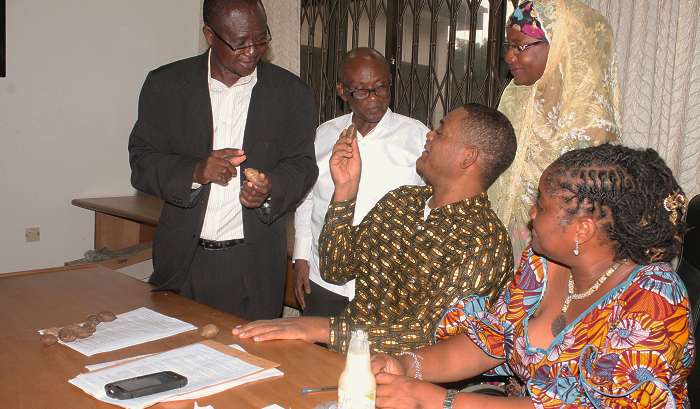
Tropical African almond tree can revamp economy — Prof. Tano-Debrah
The lack of political will to invest in other sectors of the country’s economy continues to retard development in the country, Professor Kwaku Tano-Debrah has observed.
In line with this, Prof. Tano-Debrah, who is a senior lecturer at the Department of Nutrition and Food Science of the University of Ghana, has enjoined Ghanaians to seriously consider the mass cultivation of the tropical African almond to revamp the country’s economy within the shortest possible time.
He gave the advice when the presidential candidate of the Convention People’s Party (CPP), Mr Ivor Kobina Greenstreet, led a delegation to interact with him.
The meeting, which was attended by the National Chairman of the CPP, Professor Edmond Delle, was to enable the party to learn more about how to transform the economy using the African tropical almond, locally known as “abrofo nkatee”.
Advertisement
The visit of the CPP delegation followed Mr Greenstreet’s pronouncement that the party would use the commercial cultivation of tropical almond to transform the economy.
At the recent Institute of Economic Affairs’ (IEA’s) Evening Encounter series, the CPP flag bearer referred to the potential use of tropical almond for generating billions of dollars for Ghana, as well as it being a potential job creation vehicle for the growing number of unemployed in the country.
Benefits of almond tree
Outlining some of the benefits of tropical almond, Professor Tano-Debrah said apart from the health benefits, it would also generate more income for Ghana.
“Ghana’s export earnings have been heavily dependent on a narrow range of primary commodities. The commercial cultivation of tropical almonds will be an additional revenue generation avenue for the country,” he said.
Comparing the tropical almond to cocoa, Professor Tano-Debrah stated that more revenue could be generated from the former because of the high demand for it globally.
“The tree harvests three times a year with a very good yield for the land used. Most importantly, the oil, which can be extracted cheaply and easily has a very high value of US$10,000-20,000 per tonne on the international market, while cocoa has never exceeded US$3,000-6,000 a tonne for the last 300 years and oil palm is about US$1,000 per ton,” Professor Tano-Debrah said.
No sector will be neglected
Mr Greenstreet said the fact that the party would make the cultivation of tropical almond a major focus did not mean other sectors would be neglected.
“Going into the commercial cultivation of tropical almond will open up more revenue for the country. It will also help address the growing unemployment rate in Ghana,” he said.
Mr Greenstreet, therefore, called on Ghanaians to rally behind the leadership of the CPP to transform Ghana’s economy.
